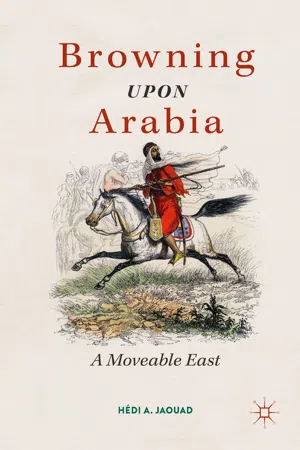Geographical references to the Orient in Browning ’s work are rare, and, except for an overland trip to Saint Petersburg, Russia, in 1834, the author never set foot in the Eastern world. 1 Nevertheless, the Orient permeates Browning ’s work. 2
Browning mainly derived his knowledge of the East through research and wide-ranging readings. His knowledge of the East is thus essentially livresque , steeped in mythology and classical knowledge, yet filtered by the lens of his own modernity . Browning ’s Orientalism reveals a sensibility of his times and, in many respects, is still pertinent to the current time as well. His Orientalism is an aesthetic formulation, one that is inimitably his own, distinct from that of his predecessors and contemporaries.
Browning was often veiled in an allegorical mist; he was interested in a symbolic more than geographical Semitic East , namely Egypt , Arabia , and Persia . This East was the cradle of monotheistic religions and belonged to a history of intense cultural, religious, and commercial intercourse with Europe . In his sympathetic treatment of the East, Browning preceded many of his contemporaries such as Benjamin Disraeli , George Meredith , and George Eliot . The latter’s view on the East, expounded in an article on Meredith , shines an interesting light on the spiritual preeminence of that culturally distant region from the perspective of the Victorian reader.
No act of religious symbolism has a deeper root in nature than that of turning with reverence towards the East . For almost all our good things—our most precious vegetables, our noblest animals, our loveliest flowers, our arts, our religious and philosophical ideas, our very nursery tales and romances have travelled to us from the East. (Eliot 1896, p. 175)
Browning set out from the beginning to distance himself from the exoticized artificial Orient , and vigorously rejected the reductive fascination with the Other , the type of fascination derided by Byron in Beppo : ‘How quickly would I print (the world delighting), / A Grecian, Syrian, or Assyrian tale: / And sell you, mix’d with western sentimentalism , / Some samples of the finest Orientalism ’ (1912, p. 143).
Instead, by endowing the often derided, caricatured, and voiceless Easterners with a genuine personality and autonomous point of view, Browning took an audacious contrarian stance. This stance is evident in his first play, Mansoor the Hierophant (later titled The Return of the Druses ), where history is written not from the viewpoint of the colonizing Hospitallers , but from the perspective of the underdog: the oppressed Druses . Browning emphasizes empowerment through self-emancipation and condemns the paternalism of Northerners . Remarkably, the Druses resent and reject the Hospitallers’ interference, as it only serves to underscore their perceived helplessness: ‘we Druses wait forsooth / The kind interposition of a boy / —Can only save ourselves if thou concede’ (4.244–246). 3 In Luria , unmistakably a frontal attack on Shakespeare ’s Othello , Browning vindicates the character of the Moor . He confronts Shakespeare in his dramatic monologue Caliban upon Setebos , when he reverses Prospero and Caliban’s roles, upsetting a well-established cultural hierarchy. Although Browning situates his Caliban in the context of ‘natural theology’ and treats him satirically, the latter is no longer portrayed as a helpless savage but more like a son of nature in the mold of the Rousseauian ‘natural man.’ Caliban’s mimicry of Prospero’s pseudo-civilized speech (a contrapuntal discursive strategy that Browning had deployed in The Return of the Druses ) becomes, as Simon Hay (1996) writes, a ‘conceptual site,’ where the dominant ideological position is challenged by subversive alternatives, and against which this dominant colonial ideology is redefined and re-defended. As such a contested concept, the figure of Caliban is a representation of the conflict in Victorian colonial discourse and hence contains the ambivalences which underpin that discourse. 4
At the time, the ‘North ’ was represented in stark contrast to the ‘South ,’ and often to the South’s disadvantage. People from the South had come to embody uncouth manners and unbridled emotions. In his long poem Microcosmos , John Davies (1603) of Hereford offers descriptions of perceived essential character traits of men from the south versus men from the north:
For South -ward, Men are cruell, moody, madd,
Hot, blacke, leane, leapers, lustfull, vsd to vant,
[…].
The Northern Nations are more moist,
and cold,
Lesse wicked and deceiptfull, faithfull, just.
It was believed, as described by William Harrison (1577) in his ‘Description of Britain ,’ that the coldness of the North rendered its inhabitants ‘of great strength and little policie,’ while those living in hot zones are weaker of body but display greater ‘Pregnancie of witte, nimblenesse of lymmes, and pollitike inuentions.’ 6
While Browning shared his contemporaries’ fascination with the East , he avoided the usual associational axes of ‘West and South ’ and ‘North and South’ in favor of ‘North and East.’ At the core of the East-North divide is an epistemological deficit, often dismissed as a clash of civilizations. In Browning ’s work, the North-East dynamic is a dialogue between equal interlocutors, an intercultural, multilingual conversation, but each configured as a hybrid specimen.
For Browning , the East and North shared a cultural basis in wisdom and tradition, but these values had become extinct in a utilitarian North. At its best, the North was a syncretic extension of the East, particularly during the Italian Renaissance . Rudyard Kipling later, at the height of British imperialism , recast the relationship in starkly chauvinistic terms. In his The Ballad of East and West , Kipling posits the relationship between East and West as an unbridgeable divide: ‘Oh, East is East, and West is West, and never the twain shall meet.’ Browning views the East, instead, as a chance for renewal and spi...
